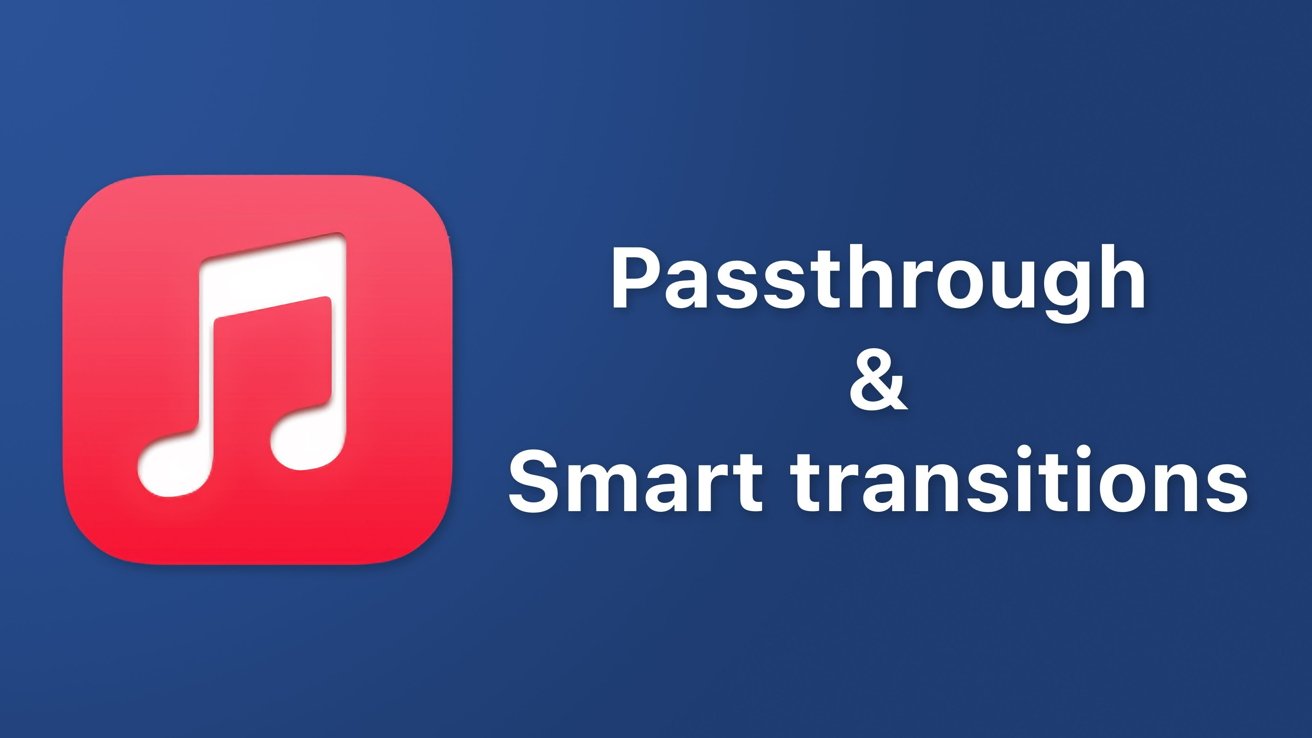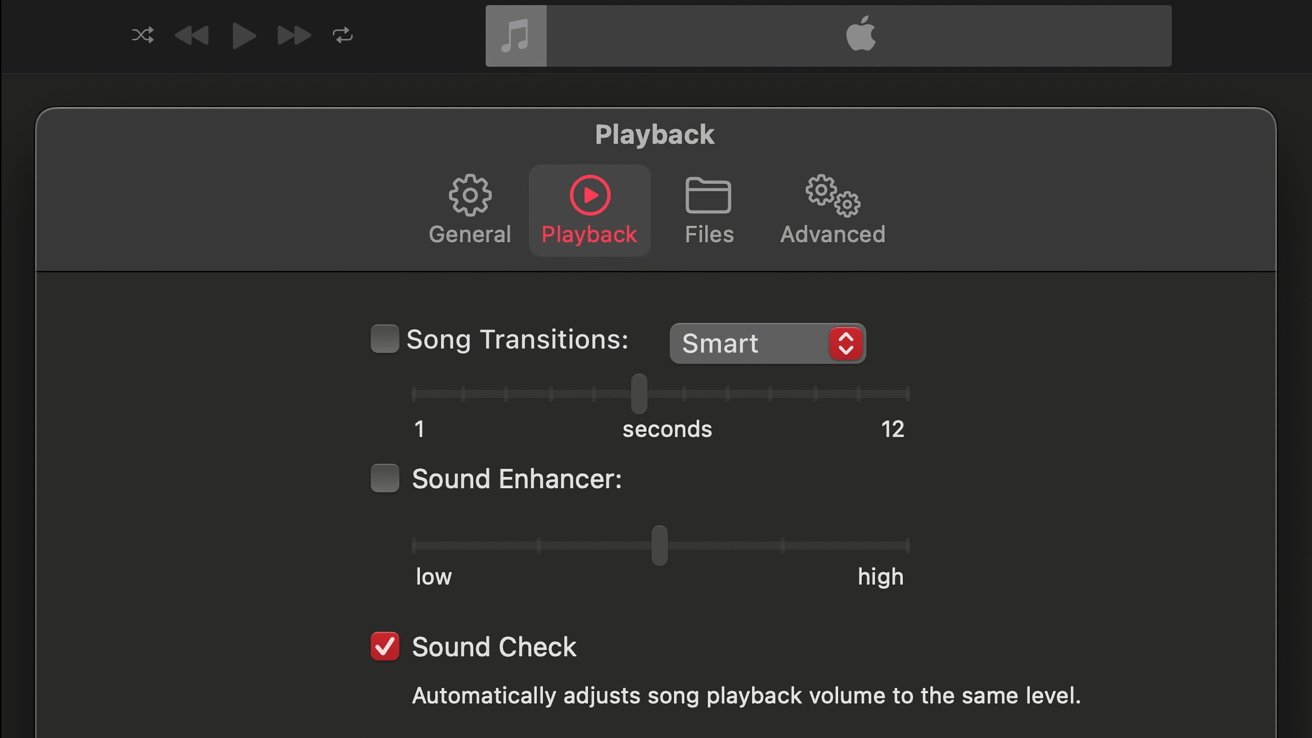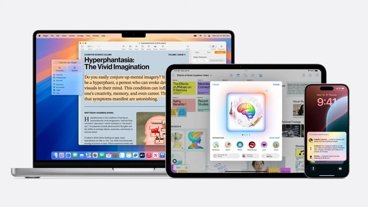Apple is internally testing improved versions of its built-in Music and QuickTime apps, which in iOS 18 and macOS 15 will gain support for smooth audio transitions and a new "Passthrough" feature.
People familiar with Apple's pre-release operating systems have revealed to AppleInsider new details on improvements currently in the works. Though on-device AI remains the primary focus of Apple's upcoming software releases, the company is also working on audio-related features for its system applications.
Apple's current iteration of the Music app already has a crossfade option. Pre-release versions of the application in internal testing contain an improved version of the feature, known for now as "smart song transitions."
With the standard crossfade option, the Music app will gradually decrease the volume of the song currently playing, as it begins to draw closer to its end. Simultaneously, the app will begin playing a new song, while slowly raising the volume — thus creating a transition between the two songs.
Smart Song Transitions will take this feature even further, by giving users the option to adjust the duration of the crossfade effect. Song transitions can be made to last anywhere from one to twelve seconds, depending on personal preference.
The existing crossfade option will remain present within Apple's Music app, as will the option to disable the feature. Overall, this is only one of a few audio-related updates Apple has planned for its system applications.
Audio Passthrough for Apple Music and QuickTime Player
The Music app will also introduce support for a feature dubbed "Passthrough," which will only be available on supported hardware. What that supported hardware is, remains unclear at this time.
Although the details surrounding this feature are also unclear, it appears to be related to Spatial Audio with Dolby Atmos, with it possibly being a rebrand of the feature.
Apple has renamed different OS features and applications over the years, with iCal eventually becoming Calendar, and System Preferences being changed to System Settings with macOS Ventura.
The company also plans to rename its user accounts from Apple ID to Apple Account, starting with iOS 18. Features can even receive a new name mid-development, as was the case with Vocal Shortcuts - originally known as Adaptive Voice Shortcuts.
Renaming Spatial Audio with Dolby Atmos to the simple "Passthrough" would seemingly fit this pattern, while also allowing for a significantly shorter name. Ultimately, though, we don't yet have a great deal of information about the feature as it exists now.
Unlike Spatial Audio, however, the Passthrough feature will apparently be available without an Apple Music Subscription, meaning it will likely be accessible to everyone. Passthrough is also set to make its way to QuickTime on macOS 15, indicating that Apple intends to make it available system-wide.
New audio features for gaming and spatial computing
Apple is also working on other audio-related improvements, focusing on audio accessories like headphones and headsets. We could see enhancements with a particular emphasis on gaming.
The company is working on more advanced versions of hands-free audio control for gaming, along with a feature known internally as "Spatial Gaming." Although there are no concrete details about the exact implementation of these features - they align with Apple's overall interest in spatial computing.
Over the years, Apple has introduced features such as Spatial Audio, which allows for an immersive audio experience by making different sounds originate from individual speakers. On Apple's AirPods, this feature is combined with dynamic head tracking to deliver surround sound and 3D audio through the headphones.
More recently, in late 2023, the company released Spatial Video, which can be recorded with the iPhone 15 Pro and viewed with the Apple Vision Pro headset. Spatial Videos are essentially three-dimensional video recordings, which allow users to relive moments and experiences.
Both Spatial Audio and Spatial Video require specialized hardware to function, as is the case with the Passthrough feature.
Passthrough and Smart Song Transitions will likely make their debut at Apple's Worldwide Developers' Conference on June 10, as part of the company's next generation of operating systems — iOS 18, iPadOS 18, macOS 15, and more.
 Marko Zivkovic
Marko Zivkovic


-m.jpg)






 William Gallagher
William Gallagher
 Andrew O'Hara
Andrew O'Hara
 Wesley Hilliard
Wesley Hilliard

 Malcolm Owen
Malcolm Owen


 Chip Loder
Chip Loder




-m.jpg)




29 Comments
I’m not sure why this article lists “Passthrough” as “mysterious.” The word Passthrough has a literal meaning in audio, and it’s a feature in other competing music player apps. It just means to pass the audio signal through with no modifications whatsoever. This is useful for delivering the highest quality audio possible to your DAC, or passing along an encoded signal to a downstream decoder.
"Renaming Spatial Audio with Dolby Atmos to the simple "Passthrough" would seemingly fit this pattern, while also allowing for a significantly shorter name."
What? That makes absolutely no sense. Yes, Apple has changed the names of various features over the years, but the new moniker made sense as a descriptor for the feature in question. "Passthrough" is in no way descriptive of spatial audio.
You might come up with better speculative ideas if you looked up the definition of the term, particularly in relation to electronics and audio: "In signal processing, a passthrough is a logic gate that enables a signal to 'pass through' unaltered, sometimes with little alteration. Sometimes the concept of a 'passthrough' can also involve daisy chain logic." This definition is from the Apple's own "lookup" feature. Setting aside the mildly amusing redundant phrase about alteration, this definition suggests that the feature will perhaps involve transmitting or transferring audio signals without degrading it by running it through some sort of compression codec. Perhaps they're devising a way to get spatial and lossless audio to wireless AirPods without squeezing it through Bluetooth.
Luckily readers explain this better. Pass through for Spatial Audio indeed makes no sense. Spatial Audio has nothing to do with sound passing through anything.
What has been sorely missing in iOS/iPadOS from the beginning is system wide audio management. I hope this is addressed.
I always hated fadeouts on songs; seems like artists just couldn’t figure out how to end it. Maybe it’s due to chiefly listening to punk rock and thrash medal, but I shan’t use crossfade or Smart Song Transitions.